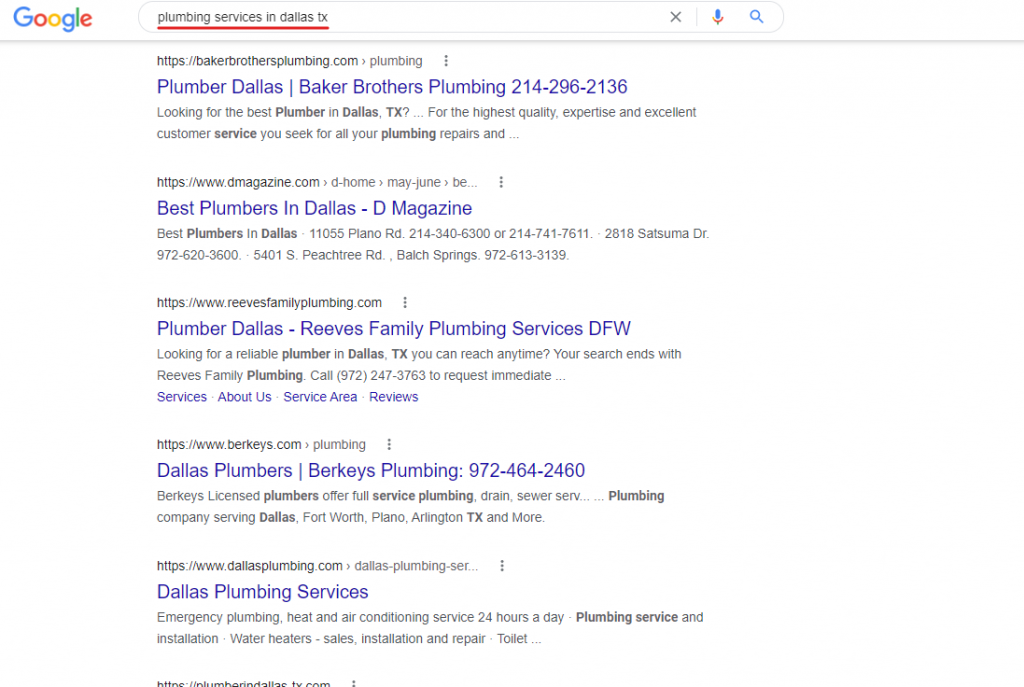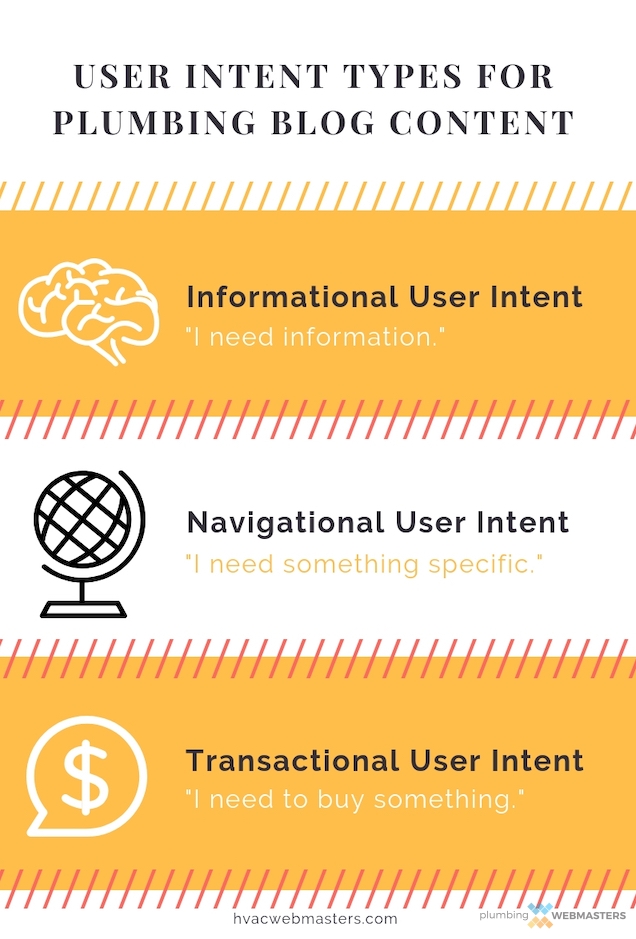When search engine users perform a search on Google or another platform, their query inherently contains an intended meaning, which is known as user intent. For example, the query plumber near me is intended to find a local plumber near the searcher’s location.

Key Takeaway
Creating content that not only optimizes for a keyword but matches the actual intent of the query boosts your website’s value and SEO.
At Plumbing Webmasters, we’ve discussed the importance of good, meaningful content for plumbers. Content can determine where you rank on search results, whether it’s a homepage, service page, or blog post.
However, when publishing plumbing blog topics or optimizing for plumbing keywords, it is also vital to consider user intent.
What is User Intent?
User intent refers to a search engine user’s intention when submitting a query. So, for instance, if a user searches for plumbing, we can’t know whether they intend to find plumbing services, its definition, or basic facts about plumbing.
But conversely, if a user searches for plumbing repair services in Dallas, TX, we know their precise intention.

How User Intent Impacts Search Results
As the top search engine globally, Google aims to deliver the most desirable results to its users. With this in mind, Google’s algorithm attempts to detect the intention of every search query. As we stated above, some terms are easier to determine than others, but Google uses various data points to help pinpoint user intent.
As a plumbing website, your job is to produce content that meets every possible user intent for your target audience. For example, some of your future customers may search for slab leak repair services, while others may search for a more general phrase like plumber near me. Therefore, websites that meet the most user intent will generate the most traffic.
Types of User Intent for Plumbing Customers
You can break down user intents into different categories as an SEO specialist or website administrator. From there, you can target the users most likely to convert into paying customers while supplementing those top-of-the-funnel prospects with secondary users.
First, let’s examine the different kinds of user intent for search users:
Informational Intent: A user seeking information about a subject (i.e., broken water pipe outside house)
Navigational Intent: A user trying to find contact information about a specific plumbing company (i.e., jimbob’s plumbing contact us)
Transactional Intent: A user seeking services and willing to invest money immediately (i.e., plumbing repair services in dallas)
As a local plumbing company, transactional intent queries are the most valuable. Users conducting these searches are ready to invest in plumbing services today, and your company can be the beneficiary.
Conversely, information intent queries are typically users seeking additional information and are not yet in the buying stage. While this traffic can still hold value for future sales, they are not as immediately beneficial to your business.
Optimizing Your Blog for Informational Intent
For well-designed plumbing websites, service pages should meet transactional intent and convert most of your visitors who intend to buy your services.
But why limit your traffic to users who are ready to buy when you can also reach users who may be prepared to buy in the future?
With this in mind, plumbing blog posts are great for bringing in future customers seeking information about plumbing. Consider some of the following blog post topics:
What To Do When Your Water Pipe Bursts? (Tips & Examples)
How Much Do Typical Plumbing Services Cost in Dallas, TX?
How To Tell If Water Damage Is New Or Old? (With Examples)
7 Toilet Flush Problems That Indicate Severe Plumbing Damage
Aside from getting more traffic to your website and appealing to potential customers, your informational blog posts can also strengthen your services page. For example, linking a blog post about burst pipes to your pipe repair service page is a great way to rank higher on the service page.
Informational content typically garners more external links than service pages, so the link equity acquired from the blog post transfers to the service page, thus improving its ranking.
Leveraging User Intent in Your Plumbing Sales Funnel
If you think about your sales funnel with prospective customers at the top and information seekers at the bottom, you can better understand how to move people to subsequent sales process stages. For example, a user searching for signs of a bad sewer line won’t buy today, but they may eventually buy your services.
One way to increase your chances is by including lead magnets in your blog posts. A lead magnet is like a value proposition that offers users something in exchange for their contact information. From there, you can remarket to the user through email marketing and provide discounts and coupons, further enticing the person to keep your company in mind.
Navigating Vague or Unknown Intent
For some queries, the intent is vague or unclear. For example, a one-word query like plumbing is inherently vague, and Google cannot know for sure what the user’s actual intent is. In these cases, it’s best to analyze the search engine results.
If you find that the term mostly prompts results of service pages or plumbing company homepages, you know that Google has determined that most users are intending to find a plumbing service. Conversely, if you find that most of the results are definitions and guides, the intent is presumed to be informational.
In some cases, you’ll find that the search results are hybrid, meaning they show a variety of content types ranging from transactional to informational. These types of results indicate that Google’s data is inconclusive on the intent.
Final Thoughts on User Intent for Plumbers
It’s important to search engines and their users that intent is satisfied when performing a search. As a result, when potential customers search for queries like slab leak repair dallas your website should provide them with a page that clearly defines your slab leak repair services in Dallas, TX.
It’s also important to avoid targeting keywords for the sake of traffic alone. If your plumbing company cannot provide real value for the intent of the query, it’s best to avoid covering the topic. When users are satisfied with your content and overall website, you’ve provided an optimal user experience, boosting SEO.






